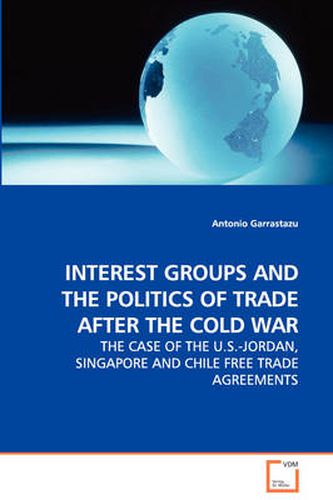Readings Newsletter
Become a Readings Member to make your shopping experience even easier.
Sign in or sign up for free!
You’re not far away from qualifying for FREE standard shipping within Australia
You’ve qualified for FREE standard shipping within Australia
The cart is loading…






This title is printed to order. This book may have been self-published. If so, we cannot guarantee the quality of the content. In the main most books will have gone through the editing process however some may not. We therefore suggest that you be aware of this before ordering this book. If in doubt check either the author or publisher’s details as we are unable to accept any returns unless they are faulty. Please contact us if you have any questions.
The politics of trade after the Cold War has transformed U.S foreign policy. Given the surge of interest in free trade agreements (FTAs) and the far- reaching political and economic repercussions of globalization, the post-Cold War period constitutes a critical juncture in the history of U.S. international economic policy and trade diplomacy. The U.S. began to seek FTAs as a way to maintain its strategic influence. Despite its hegemony, the U.S. has succeeded in negotiating and implementing relatively few FTAs. Why does the U.S. have relatively few FTAs compared to other economically powerful countries? Why has the U.S. taken longer to negotiate certain FTAs over others? The book will analyze the evolution of interest group coalitions and the persistent conflict surrounding FTAs and international trade since the end of the Cold War by examing the negotiations leading to the agreements signed with Jordan, Singapore, and Chile.
$9.00 standard shipping within Australia
FREE standard shipping within Australia for orders over $100.00
Express & International shipping calculated at checkout
This title is printed to order. This book may have been self-published. If so, we cannot guarantee the quality of the content. In the main most books will have gone through the editing process however some may not. We therefore suggest that you be aware of this before ordering this book. If in doubt check either the author or publisher’s details as we are unable to accept any returns unless they are faulty. Please contact us if you have any questions.
The politics of trade after the Cold War has transformed U.S foreign policy. Given the surge of interest in free trade agreements (FTAs) and the far- reaching political and economic repercussions of globalization, the post-Cold War period constitutes a critical juncture in the history of U.S. international economic policy and trade diplomacy. The U.S. began to seek FTAs as a way to maintain its strategic influence. Despite its hegemony, the U.S. has succeeded in negotiating and implementing relatively few FTAs. Why does the U.S. have relatively few FTAs compared to other economically powerful countries? Why has the U.S. taken longer to negotiate certain FTAs over others? The book will analyze the evolution of interest group coalitions and the persistent conflict surrounding FTAs and international trade since the end of the Cold War by examing the negotiations leading to the agreements signed with Jordan, Singapore, and Chile.